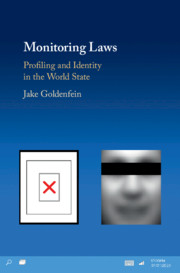
- Cited by 3
-
Cited byCrossref Citations
This Book has been cited by the following publications. This list is generated based on data provided by Crossref.
Benthall, Sebastian and Goldenfein, Jake 2020. Data Science and the Decline of Liberal Law and Ethics. SSRN Electronic Journal,
2024. The Cambridge Handbook of Facial Recognition in the Modern State. p. 9.
Goldenfein, Jake 2024. The Cambridge Handbook of Facial Recognition in the Modern State. p. 74.
- Publisher:
- Cambridge University Press
- Online publication date:
- November 2019
- Print publication year:
- 2019
- Online ISBN:
- 9781108637657


